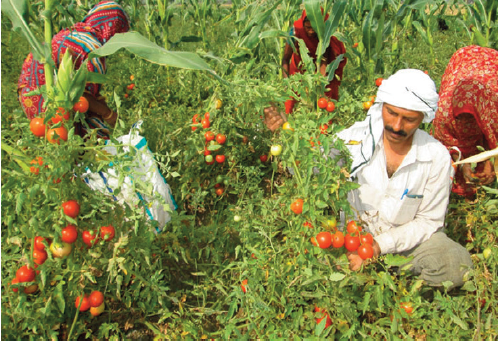- Have any questions?
- 011- 43502031 / 43502032
- 0120-4152732
- info@nagrikfoundation.org
Onion is a politically sensitive crop……
September 7, 2018The Grey Areas in TOP Zones
September 7, 2018 he paid Rs 22 per box as transportation and other charges. After two hours of bargaining, he got Rs 100 per box. “It was not enough to recover even my cultivation costs,” Baig says. Balineni Ravindra Prasad of Vanamaladinne is among those who have left his ripe tomatoes for now on his 5-acre field.
he paid Rs 22 per box as transportation and other charges. After two hours of bargaining, he got Rs 100 per box. “It was not enough to recover even my cultivation costs,” Baig says. Balineni Ravindra Prasad of Vanamaladinne is among those who have left his ripe tomatoes for now on his 5-acre field.
A Subbaraghava Raju, Secretary of the Madanapalle Agriculture Marketing Yard, admits that price fluctuations can devastate farmers, and hence welcomes the Union Budget’s proposal of tax breaks for farm producer organisations (FPOs), formed by them. “FPOs can help farmers unite and negotiate a steady price,” he says. However, he admits, “Medium and big farmers may not be interested, as they can afford to take losses but may not be willing to give up the quick money they make when prices go up suddenly.”
As for the suggestion by the Andhra government that they take recourse to food processing units, farmers say it is not practical right now. “Such units come to yards to purchase only when stocks are being sold at throwaway prices. If the government sets up factories for tomato puree or ketchup or juice, they should purchase the stocks at prices that are beneficial to all parties.
Then we would sell entire stocks to factories from the farm itself,” says farmer K Ramana of Chittoor. Secretary Raju contests this claim of private players benefiting, pointing to the downed shutter of Reliance’s procurement office at the Madanapalle market yard. “Their procurement here is over. Now they are purchasing vegetables in Karnataka for their outlets. If there is a glut in the market, even at Rs 2 or 3 per kg, there won’t be many buyers.” The Andhra Pradesh government has started a programme to address the fluctuating tomato prices. Horticulture Commissioner Chiranjeevi Chowdhary says they have tied up with Japanese company Kagame, which is supplying seeds on an experimental basis to grow tomatoes that can be used in food processing factories globally. Anji Reddy, a big farmer owning 20 acres, has sown this seed on 5 acres. “If the experiment is successful, all farmers can sow two varieties — one for the open market and the other for food units — and prevent excessive production and price fluctuations,”Reddy says.
Meanwhile, it is hard to find a farmer below 45 years in the over 1,500 acres of cultivable land in Vanamaladinne. Naidu says he tried very hard to persuade son Sukumar to join farming, but he chose engineering and now works at an IT major in Bengaluru. Prasad, whose son too works for a corporate in the city, laments that he chose the Rs 20,000 per month job over the family profession. Many of the elders are now seeking retirement security in mango orchards. “We are reducing the acreage under tomato and other crops and started growing mango trees. Once the trees grow, they don’t need much care. After a few years, the orchards will start paying rich dividends,” says Naidu, who is growing mango on 5 acres. Prasad, who has also done the same, says he welcomes the Centre’s suggestions. “But it will take sustained effort from governments to bring back confidence in farming… The Centre’s measures will take at least a decade to trickle down.”
Anji Reddy, a big farmer owning 20 acres, has sown this seed on 5 acres. “If the experiment is successful, all farmers can sow two varieties — one for the open market and the other for food units — and prevent excessive production and price fluctuations,” Reddy says.
